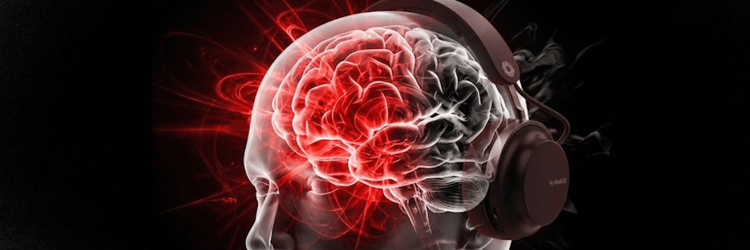You get up and head to the kitchen to grab something, but once you’re there… nothing. You’ve completely forgotten why you came. So you just stand there, confused, searching your mind while it feels like your brain has hit 'force quit' and your system hangs like Windows XP after you hit refresh. That, in its simplest form, is brain fog: a state of mental cloudiness, sluggishness, lack of clarity, and an inability to stay focused.
Suggested Read:
Sychedelic Headphones for Relaxation and Anxiety
The Future of Wearable Tech From Fitness to Brain-Boosting
As much as we’d like to stay laser-focused 24/7 and operate at superhuman levels, brain fog is almost unavoidable. Unless, of course, you always sleep and eat on time, avoid stress, never overwork, always exercise, and somehow keep your screen time in check. If you’ve mastered all of that how does it feel to be a certified superhuman?
But for the rest of us, what can we do when our brains start to lag? Do you turn to focus apps or guided meditations? Do binaural beats actually help? Or is it time to reconsider your lifestyle habits, perhaps a complete overhaul?
yes
At this point, we might as well rename this blog 'How to Become a Superhuman.' But let’s be real who has the time? That’s why we’re giving you both: the short-term fixes to get back on track now, and the long-term strategies to keep brain fog at bay. The choice is yours.
Suggested Read:
Bend Time to Your Will and Get More Done with These Unconventional Ways
The Long-Term Plan
1. Eat well. Sleep well. Exercise as well.
You’ve heard this advice a thousand times—so much so that it feels like a generic solution for every problem under the sun. It's boring advice because it's repeated way too often. But why? Maybe because it works.
Think of it this way: these are the building blocks of life. They’re not just buzzwords, in fact they are fundamental to your brain health, gut health, and overall well-being. They affect everything from how sharp your focus is and how productive you feel to your mood, energy levels, and yes—your mental clarity, or lack thereof.
Why these?
2. Use Focus and Mindfulness Apps
Mindfulness and meditation might just be the third most repeated life advice (right after 'drink more water,' which you absolutely should, by the way). But how exactly does it help reduce brain fog and improve focus?
The answer is pretty direct meditation reduces stress and anxiety over time by training your mind to focus on the present. When you stress less, cortisol levels (your primary stress hormone) decrease, leading to improved mental clarity and fewer instances of brain fog.
Focus apps go beyond guided meditations to offer tools like Pomodoro timers, Binaural Beats, Digital detox challenges, and habit trackers.
Suggested Read:
They Designed Your Screens to Ensure You Fall Behind—It’s Working
The Science Behind Sychedelic Headphones: A Simple Way to Transform Your Brain
The Short-Term Fix
Now that we’ve preached what we had to preach. Here’s the real talk - sometimes you just want to shake off the brain fog and get some work done. Which is fair, and it’s also why this blog has a part 2 - here come the quick fixes.
1. Focus Improvement Games and Exercises
Games, especially those designed to enhance memory, focus, attention span, problem-solving, and decision-making, give your brain a run for its money. They’re refreshing, a break from the rut, challenging, and also help oil the engines of your brain on a particularly 'meh' day.
2. Binaural Beats for Focus
This entire blog has mentioned binaural beats a couple of times. It’s not an uncommon word, it’s definitely heard of—but does anyone really know what binaural beats are? And, how do they seriously help?
Binaural beats (generally heard through headphones/earphones etc.) are nothing but auditory illusions created with tones of slightly different frequencies played in each ear. This makes your brain perceive a third frequency altogether.
Theories suggest that this third sound stimulates your brain waves by syncing your brain waves with the beats, possibly helping you achieve different goals depending on the frequencies of binaural beats.
For extreme focus—people tend to listen to 40 Hz, while for relaxation, people listen to 10 Hz, both of which help reduce brain fog.
3. Coffee Coffee Coffee
Alright, we’ll admit, this one’s a biiit of a cheat code. To be fair, too much caffeine can actually make brain fog worse in the long run. But if you’ve had a rough night and can’t make sense of what your boss is saying in the morning, a cup of coffee might just save the day.
Caffeine gives your brain a quick surge, making you feel more awake and focused - at least for a while. Just don’t go overboard; one cup is often enough to clear your head without going into over-caffeinated chaos
And there you have it—the quick fixes and long-term plans to up your focus in real-time. While brain fog isn’t a serious medical condition, it’s not something to brush off if it’s happening often (the occasional off day is totally normal).
Try focus apps, give binaural beats a shot, and work on improving your lifestyle bit by bit. Perfection isn’t the goal—nobody’s expecting that. But hey, wouldn’t it be cool to feel a little superhuman now and then?
Suggested Read: The Kind of Music the Top 1% Listen to, to Increase their Focus and Attention
And there you have it—the quick fixes and long-term plans to up your focus in real-time. While brain fog isn’t a serious medical condition, it’s not something to brush off if it’s happening often (the occasional off day is totally normal). Try focus apps, give binaural beats a shot, and work on improving your lifestyle bit by bit. Perfection isn’t the goal—nobody’s expecting that. But hey, wouldn’t it be cool to feel a little superhuman now and then?
More in Focus












